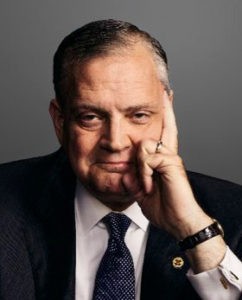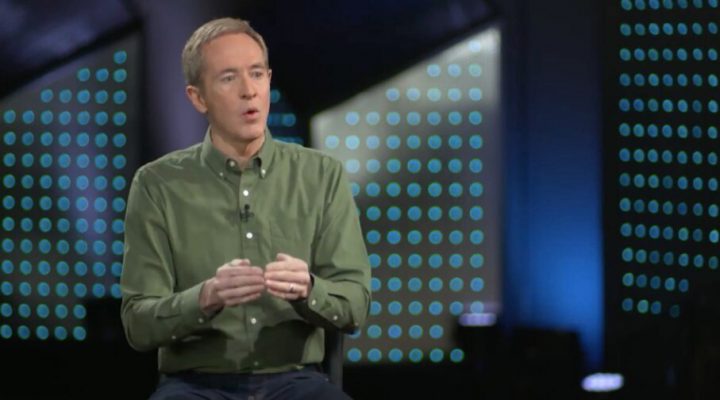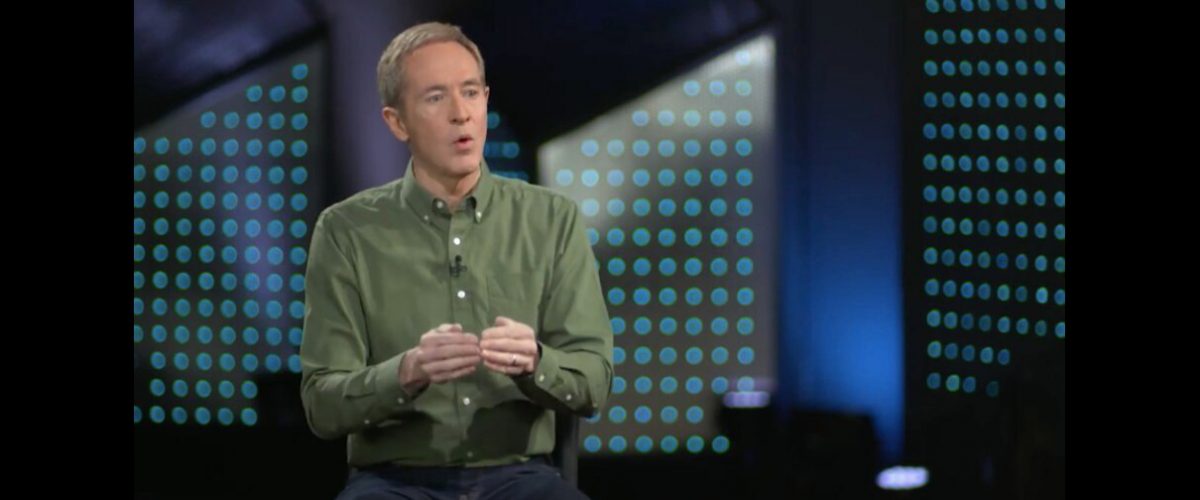“Farewell, Andy Stanley.” So seems to be the response from Al Mohler, Christianity Today, and many other evangelicals to Stanley’s defense of North Point Community Church hosting the Unconditional Conference for LGBTQ Christians and their parents.
Sam Allberry, writing for Christianity Today, argues Stanley “seriously undermined” a “New Testament sexual ethic.” As a single man, Allberry claims Stanley was “saying the very same thing to me that the Devil says.” Because Allberry believes “eternity is at stake,” he accuses Stanley of “nothing short of sending people to hell.”

Sam Allberry
Allberry serves as associate pastor of Immanuel Nashville and is the author of Is God Anti-Gay? and You’re Not Crazy: Gospel Sanity for Weary Churches. Russell Moore, editor of Christianity Today, serves as minister in residence at Immanuel Nashville.
For Allberry and Christianity Today, it is not simply enough to call out the conference or Stanley. Instead, they claim, “North Point as a whole is implicated” and the megachurch “invites the censure of Christ himself.”
Mohler, president of Southern Baptist Theological Seminary, agrees, calling Stanley’s sermon “a subversion of the gospel,” a “first-order crisis,” and “a departure from the faith once delivered to the saints.”
“This is not biblical Christianity. It is Andy Stanley’s own invention, and it is not plausible,” Mohler warns. “The train has indeed left the station, and my guess is that even Andy Stanley has no assurance of where his logic is headed.”
Let’s clarify where Andy Stanley is headed
One wonders if Mohler even listened to Stanley’s Oct. 1 sermon given how dishonestly he mischaracterized it. The sermon was preached after Stanley and his Atlanta church were denounced by Mohler and others for hosting a conference to help parents of LGBTQ kids.
“He did not really clarify his personal convictions on LGBTQ issues, nor did he really clarify the position or policy of his church,” Mohler claimed.

Andy Stanley
Contrast that with Stanley’s own words from the sermon itself.
“We teach what I refer to as a New Testament sexual ethic,” Stanley said. “If you’re going to follow Jesus, here’s what it looks like sexually to follow Jesus:
- Honor God with your body.
- Don’t be mastered by anything.
- Don’t sexualize a relationship outside of marriage.”
To clarify even further, Stanley said: “We affirm all three of the Apostle Paul’s statements on the topic of same-sex sex — Romans 1, 1 Corinthians 6, 1 Timothy 1 — he references this. And we affirm exactly what the Apostle Paul says. In other words, what the Apostle Paul called sin was sin then and it’s sin now.”
But what about same-sex marriage?
“We talk about and teach about marriage the same way Jesus and the apostles do,” Stanley explained. “Every instruction in the Bible regarding marriage references or assumes a husband and a wife, a man or a woman. So biblical marriage is between a man and a woman. We’ve never shied away from that. We don’t change the words in order not to offend people.”
And lest Christianity Today or Mohler claim North Point’s logic is heading toward affirming same-sex marriage, Stanley said, “We’re not going to blink on this.”
North Point’s relationally driven circles
Despite North Point’s clarity in its commitment to marriage being between one man and one woman, the church’s ultimate goal is to move toward one another in relationships. Or as Stanley puts it, they are “relationally driven.”
Stanley uses the metaphor of a circle to demonstrate how he relates to people who are different than he is. Jesus “drew circles so large and included so many people in his circle that it consistently made religious leaders nervous.”
One of those religious leaders today would be Mohler. Without mentioning Mohler by name, Stanley discussed Mohler’s previous article about him and the church and the conference.
“In my opinion, just my opinion, his version of biblical Christianity is the problem.”
“The author is actually accusing me of departing from his version of biblical Christianity. So I want to go on record and say that I have never subscribed to his version of biblical Christianity to begin with,” Stanley declared. “In my opinion, just my opinion, his version of biblical Christianity is the problem. His version, this version of biblical Christianity is why people are leaving Christianity unnecessarily. It’s the version that causes people to resist the Christian faith because they can’t find Jesus in the midst of all the other stuff and all the other theology and all the other complexity that gets globbed on to the message.”

Al Mohler
Mohler fired back: “Stanley represented my understanding of biblical Christianity as drawing lines. The problem with Stanley’s assertion that Jesus drew circles rather than lines is that the four Gospels consistently present Jesus as drawing both.”
But Stanley’s circle metaphor wasn’t meant to say North Point has no convictions. He made it quite clear that they do. Instead, Stanley’s circle metaphor was about how they prioritize relationships.
“We aren’t condoning sin,” he said. “We are restoring relationships. … Our message is come and see and come sit with me.”
As Stanley’s sermon concluded, he shared the vision of Jesus in Matthew 11:28-29, stating, “Come to me, all you who are weary and burdened, and I will give you rest … rest for your souls.” Then he highlights the word “all,” and emphasizes, “All — that’s a big circle.”
North Point’s recognition of unhealthy parenting
Rather than speaking in generalities about how churches haven’t been perfect in their responses to LGBTQ people, Stanley recognizes and names specific ways in which Christian parents and the church have failed.
One mother of a gay child at North Point told Stanley, “When our children come out of the closet, and we discover our child is LGBTQ, most Christian parents go into the closet, where many experience isolation and depression. Being in the closet prolongs your pain.”
Another father of a gay son who attempted suicide told Stanley, “I went into one closet. My wife went into a different closet, and then we turned out the lights.”
“While men like Mohler brush these fears off in the face of biblical certainty, Stanley is at least recognizing some level of pastoral responsibility.”
For pastors and missionaries, a child coming out to them can be career threatening. Stanley said: “Imagine this. You are pastoring a church where your child isn’t welcome. You are pastoring a church and you have to keep what’s going on in your family a secret from the church people, otherwise you will feel judged and alienated by the people you are shepherding.”
He continued: “Missionaries have said, ‘If my mission board found out about my daughter, they probably would kick me off the mission field. If my support group, my financial support group found out about my son, I would lose my financial support.’”
The fears conservative evangelical parents face include the eternal damnation of their child, the loss of dreams for their family, and perhaps their loss of ministry or career. This is a lot of trauma for parents to hold alone.
While men like Mohler brush these fears off in the face of biblical certainty, Stanley is at least recognizing some level of pastoral responsibility.
“We parent through the filters of our heart. We parent through the filter of our insecurities. We parent through the filters of our fears,” Stanley said. “And we parent through the filters of our hopes and dreams for our kids. And when a young man or a young woman comes out to their parents that they’re gay, or whatever term they use, in that moment, the parents’ insecurities and fears skyrocket, and in that moment their hopes and dreams for their children vanish.”
The impossible burden that LGBTQ kids bear
While kids may not fully grasp the depths of the pain their parents experience in life, they feel the weight of it. And no child is strong enough to bear the weight of feeling responsible for their parents’ lost hopes, dreams and careers, or of their parents’ insecurities and fears over the eternal suffering of their children.
“No child is strong enough to bear the weight of feeling responsible for their parents’ lost hopes, dreams and careers.”
When you realize that children bear that unspeakable weight over who they are, it’s no wonder LGBTQ children struggle with opening up to their parents. No child wants to crush their parents to that degree.
Stanley said, “They’re afraid of disappointing their parents. Depending on the church that they attend, they are literally afraid they are going to hell not because of anything they’ve done, but because of who they are, because of the message not of culture, the message of the church.”
North Point’s listening to LGBTQ Christians
Christians who are fully affirming of LGBTQ people may receive Stanley’s words about circles and relationships with skepticism given his rejection of same-sex marriage. But despite the differences we may have with Stanley, he has demonstrated over the past decade a willingness to listen to LGBTQ Christians to a degree that men like Mohler never could dream of.
When Stanley began considering how to shepherd families through their journey, he asked a group of gay couples who were attending his church, “How do you wish the church had responded when you came out?”
Stanley said they told him, “I can’t believe anyone in the church is even interested in my story.”
Over the past decade, North Point has helped LGBTQ kids and their parents move toward one another in conversation. They encouraged parents not to respond by pulling out the verses and arguing in an attempt to “convince, convict, coerce and control.” They not only helped the children open up about their feelings, but also guided the parents toward dealing with their own insecurities and fears.
These regular monthly gatherings grew to include 350 parents and their children in conversation.
“To me, that is an extraordinary win,” Stanley said. “Once upon a time, the last place a middle school student or a high schooler was going to talk about their same-sex attraction, the last place they were going to talk about it was where? In church. And now they feel confident and they feel connected to where they can talk about the most sensitive area of their life with their small group leader in church.”
The Unconditional Conference
Perhaps the most controversial feature of the Unconditional Conference was that its organizers invited Justin Lee and Brian Neitzel, both gay married men, to speak.
Conservatives pounced on their presence as an example of Stanley affirming same-sex marriage. But Stanley doesn’t see it that way.
“The day that they discover one of their children or one of their grandchildren claims to be gay or transgender or questioning, they are going to scramble for people that can help them get inside the hearts and minds of their children.”
“They know that I don’t line up with everything with them theologically or the way they interpret certain passages of Scripture,” Stanley said. “But the conference wasn’t for me. The conference wasn’t for most of you. I guarantee you the conference wasn’t for any of the critics because the moment or the day that they discover one of their children or one of their grandchildren claims to be gay or transgender or questioning, they are going to scramble for people that can help them get inside the hearts and minds of their children.”
And that’s precisely why Lee and Neitzel were present. Stanley said: “It is virtually impossible for a straight, heterosexual parent to understand what’s going on in the heart and mind of their same-sex attracted child, when oftentimes their own child can’t or won’t verbalize it. And these two guys have an incredible way of helping parents understand what’s going on in the mind and the hearts specifically of their gay kids. They do an incredible job helping Christian parents understand because they have been where those parents’ children are.”
Following Jesus or moving toward Jesus
One part of the conversation about LGBTQ people that is crystal clear is how many of them move toward Jesus, despite conservatives complaining they aren’t following Jesus or cannot be truly Christian.
“Most, not all, most gay men or women you know, once upon a time, they were a kid with a terrifying secret, and they asked God to change them, and God did not answer their prayer,” Stanley reminded his congregation.
In one letter a mother sent to Stanley about her gay son, she said: “If there’s ever been a precious soul who wanted to please God and be kind to others, it’s Michael.”
Regarding how North Point’s gay attenders process what conservative evangelicals point to as God’s plan for marriage, Stanley said: “They hoped for that. They prayed for that. They prayed that God would change them so they could experience it, but I’ve sat in small groups of gay men 35 and up to 65, and watched them weep because they don’t have family. They couldn’t have family. They prayed for that, and God didn’t answer their prayer. And they are convinced that traditional marriage is not an option for them. So they commit to living a chaste life, in old-fashioned words. And for many men and women who put their faith in Christ, they just decide, ‘OK, I’m going to buckle down. I’m just going to bear down. I’m just going to be by myself. I’m not going to have family. I’m going to be sexually pure.’ And many do that for long seasons of time. And for some, it’s their whole life.”
These are not people who are hardening their hearts and willfully rejecting Jesus. These are deeply hurting people who are moving toward Jesus, as evidenced by their prayers and their attempts to please Jesus. While Christianity Today and Mohler may quibble with Stanley’s words about them following Jesus, it cannot be denied that they are attempting to move toward Jesus.
What’s missing is honesty about biblical sexuality
In Mohler’s retort of Stanley’s sermon, he talks about how Stanley is missing repentance from sin and sanctification. He also talks about Stanley unhitching the church from the Old Testament and now from the apostles.
But what’s really missing here is honesty about biblical sexuality.
As Mike Phillips, a former pastor and a current sex and trauma therapist, writes, sexuality in the Hebrew and Christian Scriptures not only was culturally situated within the patriarchal assumptions of ancient Near-Eastern culture, but evolved over time through the influence of Greek and Late Second Temple sexual practices. Given the massive amount of differences between sexual ethics throughout the Scriptures and our cultures today, Phillips says, “There is no reasonable way to match up their ethics with ours.”
If we assume, as conservative evangelicals do, God inspired the Bible in some way, then the laws about sexuality in Scripture have to be seen as some degree of cultural accommodation rather than as a consistently clear policy of heterosexual monogamy. Even conservatives admit this principle when it comes to polygamy in the Bible.
If God would accommodate an ancient violently patriarchal culture’s views of sexuality and marriage without them having any self-awareness of the harm they were causing simply in order to remain in and cultivate a relationship with them, why wouldn’t God accommodate the experience of LGBTQ people who are moving through self-awareness toward relationship with God and the local church?
While the God of the Scriptures moved toward relationship through accommodation, Mohler and Christianity Today pretend like God refuses to relate to us like God related to people in the Scriptures. The ancient patriarchs and warriors could wield their power over women in sexuality and marriages that were designed to distribute wealth for the economic advantage of providing household heirs, but we can’t even masturbate.
What if God was relationally driven, could help us process our insecurities and fears and could relieve our impossible burdens by sitting with us as we listen to one another, move toward one another and become more honest about how the Bible talked about sexuality and the feelings we’re flowing through?
But conservative evangelicals are unwilling to do that. They are heaping impossible burdens on kids and parents. And that’s why we need more pastors who, despite their convictions, are willing to widen their circle by trusting in a God who moves toward us in accommodation of our human longing for community and wholeness.
And perhaps that’s why Stanley said: “For many, that is not sustainable. And so they choose a same-sex marriage, not because they’re convinced it’s biblical. They read the same Bible we do. They chose to marry for the same reason many of us did. Love, companionship and family. And in the end … it’s their decision. Our decision is to decide how we respond to their decision. … And we decided 28 years ago, we draw circles. We don’t draw lines.”
Rick Pidcock is a 2004 graduate of Bob Jones University, with a Bachelor of Arts degree in Bible. He’s a freelance writer based in South Carolina and a former Clemons Fellow with BNG. He recently completed a Master of Arts degree in worship from Northern Seminary. He is a stay-at-home father of five children and produces music under the artist name Provoke Wonder. Follow his blog at www.rickpidcock.com.
Related articles:
Al Mohler vs. Andy Stanley: What’s really going on? | Opinion by Mark Wingfield
Criticism of Andy Stanley is rooted in father wounds | Opinion by Rick Pidcock


